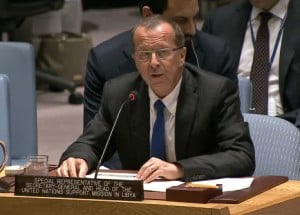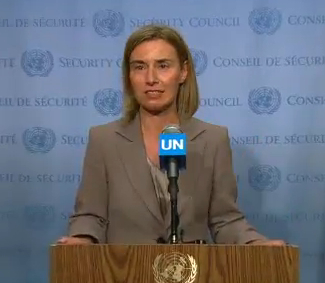By Libya Herald reporters.

Tunis, 6 June 2016:
The Presidency Council must immediately sort out the dearth of cash, food and power in . . .[restrict]the west of the country while the House of Representatives in the east must get on with a vote on the Government of National Accord, UNSMIL chief Martin Kobler told the UN Security Council in New York today.
In a notably nuanced report on UNSMIL’s recent work, he referred to the “Libyan army” moving into the oil crescent from the east. After approving the PC-endorsed Bunyan Marsous operation against IS in Sirte, Kobler went on to commend “all those who fought against terrorism in all parts of the country, including in Benghazi and Derna” .
There was however nothing nuanced in his insistence that the PC get a grip on the problems in the west of Libya. “Immediate steps are needed to ensure that shortages in cash availability, food and electricity are satisfactorily addressed without further delay”. He added that the UN and its partners in the international community were ready to assist, but did not say what form that help might take.
Nor did Kobler conceal his impatience with the HoR and its president (speaker) Ageela Saleh. “After two unsuccessful attempts [to hold a vote] in February and April,” said Kobler, “it is high time that the Speaker assumes his responsibilities to convene a parliamentary session free of intimidation and threat for a vote on the proposed Government of National Accord”.
Kobler bemoaned the crisis in which Libya still found itself, just a week short of six months after the signing of the Libyan Political Agreement in Skirhat.
Six thousand families had fled IS-occupied Sirte and there were now a “staggering” 435,000 internally displaced Libyans.
He warned: “The capacity of local communities and of aid agencies to host and provide assistance has been stretched to the breaking point”.
Meanwhile, migrant deaths had increased by more than 30 percent over the same period last year. In May alone, he reported, 1,100 migrants had drowned, 500 of them on a single day.
He also cautioned that there were 20 million weapons in a land of six million people.
“These weapons do not fall from the sky,” he said, “but come in increasingly through illegal shipments by sea and by land. These arms fuel the conflict”.
Clearly referencing EU moves for a UN mandate to interdict illegal weapons supplies, Kobler insisted that the arms shipments had to end if there were to be any serious hope of bringing peace to Libya.
Kobler’s high praise for the PC nevertheless had a sting in its tail.
“Armed with nothing but the legitimacy bestowed on them by the Libyan Political Agreement,” he said, “seven courageous members of Libya’s Presidency Council took the bold step on 30 March to courageously cross the sea from Tunisia to Tripoli”.
But he warned: “The sense of hope and optimism with which people across Libya welcomed the signing of the Agreement and the arrival of the Presidency Council in Tripoli stands in contrast today to their sense of growing impatience and concern”.
Kobler also said that he was concerned to avert conflict between the different Libya forces involved in the fight against IS. To do so would require an inclusive interim security arrangement, including temporary command and control arrangements for the army. He did not spell out what those arrangements might be, nor mention Khalifa Hafter, the HoR-appointed commander-in-chief of the Libyan Armed Forces. But he warned: “Uncoordinated military actions on the ground have raised the spectre of direct clashes between different forces fighting Daesh [IS]”. [/restrict]








